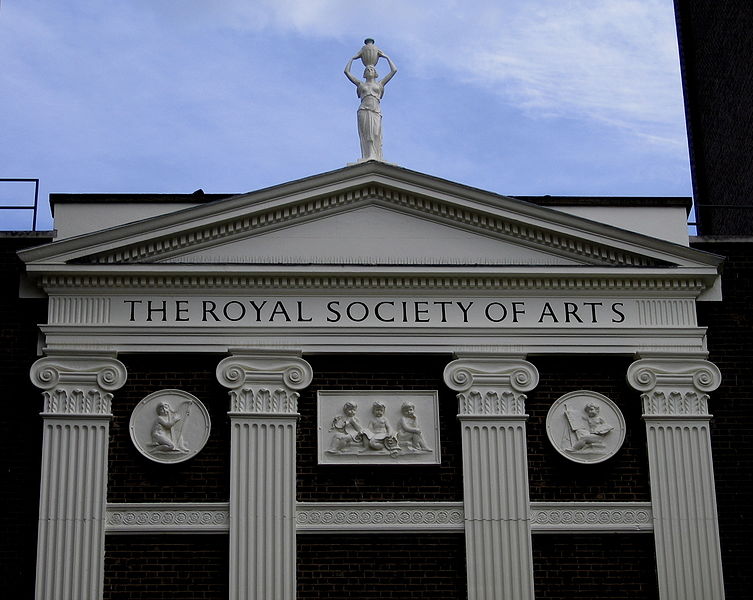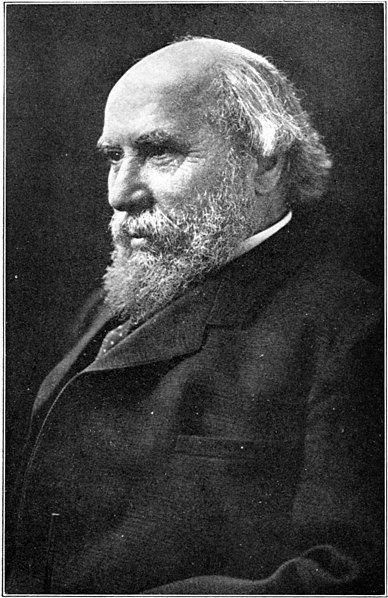In the most recent Age of Invention newsletter, Anton Howes explains why the Society of the Encouragement of Arts, Manufactures and Commerce (now the Royal Society of Arts) wasn’t a fan of the British patent system and preferred to award prizes in areas that were unlikely to generate monopoly situations:

The back of the Royal Society of Arts building in London, 25 August 2005.
Photo by C.G.P. Grey (www.CGPGrey.com) via Wikimedia Commons.
… the Society’s early members had an aversion to monopolies, and patents are, after all, temporary monopolies. But there was actually a more practical reason to not give rewards to patented inventions. In fact, quite a few active members of the Society were themselves patentees, and patents for inventions were not generally lumped together for condemnation with practices like forestalling and engrossing. The practical reason for banning patents was that there was no point giving a prize for something that people were already doing anyway. Patents were expensive in the eighteenth century — depending on how you account for inflation, it could cost about £300,000 in modern terms to obtain one — so the fact that there was a patent for a process was a clear indication that it might be profitable. The Society, by contrast, was supposed to encourage things that would not otherwise have been done.
Thus, when a patent had already been granted for a process the Society had been considering giving a premium for, it purposefully backed down — not because the prize would infringe on the patent, but because its encouragement was no longer necessary. And so the effect of the ban on patented inventions was that the Society received, even unsolicited, exactly the kinds of inventions that there was less monetary incentive to invent. Occasionally, this meant trivial improvements — minor tweaks, here and there, to existing processes. An engineer might patent one invention, but not see it worth their time patenting another — through the Society’s prizes, they might at least get a bit of cash for it, or some recognition. The improvement would also be promoted through the Society’s publications. Or, the Society received inventions that were far from trivial, like the scandiscope for cleaning chimneys [here], but which were not all that profitable: inventions that saved lives, or had other beneficial effects on the health and wellbeing of workers and consumers. And finally, the Society received innovations that could not be patented, such as agricultural practices and the opening of new import trades. In the early nineteenth century the Society awarded its prizes to a whole host of naval officers, including an admiral, who came up with flag-based signalling systems between ships — early forms of semaphore.
Another effect of the ban on patents was that the Society also attracted submissions from different demographics. Many of its submissions came from people who were too poor to afford patents, as well as from those who were too rich — wealthy aristocrats for whom commercial considerations might seem vulgar. The poor would generally go for the cash prizes, and the aristocrats for the honorary medals. And the prizes were used by people who might otherwise be socially excluded from invention. In 1758, for example, the Society instructed its members in the American colonies to accept submissions from Native Americans. It also allowed women to claim premiums (just as it allowed them to be members). My favourite example is Ann Williams, postmistress at Gravesend, in Kent, who won twenty guineas from the Society in 1778 for her observations on the feeding and rearing of silk-worms. She kept them in one of the post-office pigeon-holes, referring to them affectionately as “my little family” of “innocent reptiles”. Unlike other elements of society, the Society of Arts accepted, as she put it to them, that “curiosity is inherent to all the daughters of Eve.”
The Society thus encouraged the kinds of inventions that might not otherwise have been created, and catered to the kinds of inventors who might not otherwise have been recognised. Rather than competing with the patent system, it complemented it, filling in the gaps that it left. The Society operated at the margins, and only at the margins, to the better completion of the whole. It found its niche, to the benefit of innovation overall.













